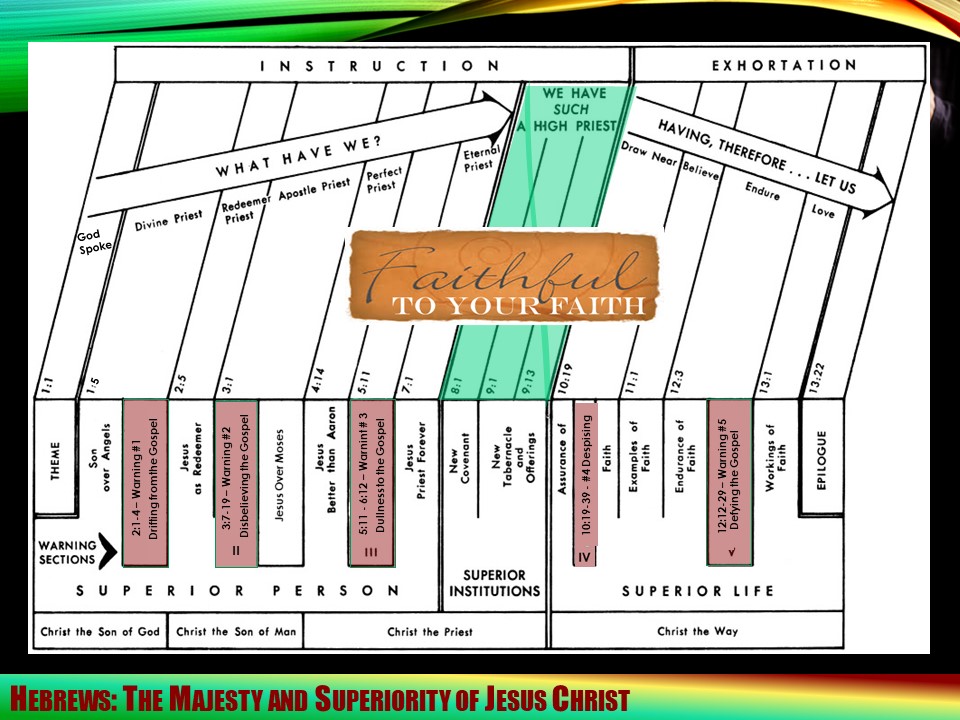Hebrews 1:1-4
God Has Spoken
Hebrews?
Who were these Hebrews who were being addressed in this great letter? Think about the Jew’s ![]() history and heritage which had begun 2000 (or so) years earlier with Abraham. Going to the Canaan, receiving the Promises of God, bondage in Egypt for 400 years, the Wilderness Wanderings, Moses and the Law. The Jews of the First Century AD knew that legacy as their only way of life. But then, for many Jews, the claims of Jesus Christ shook them at their roots. After His resurrection, thousands of Jews placed their faith in Him as their Savior and Messiah. Then in 64 AD, the wild Emperor Nero burned Rome to the ground. He blamed the Christians and thus began a terrible persecution which caused
history and heritage which had begun 2000 (or so) years earlier with Abraham. Going to the Canaan, receiving the Promises of God, bondage in Egypt for 400 years, the Wilderness Wanderings, Moses and the Law. The Jews of the First Century AD knew that legacy as their only way of life. But then, for many Jews, the claims of Jesus Christ shook them at their roots. After His resurrection, thousands of Jews placed their faith in Him as their Savior and Messiah. Then in 64 AD, the wild Emperor Nero burned Rome to the ground. He blamed the Christians and thus began a terrible persecution which caused widespread dispersion of Jews & Christians forced from their homes and livelihoods to survive in foreign lands. The majority of first century Christians were meeting in small house churches throughout Israel and northward into Syria and Galatia.
widespread dispersion of Jews & Christians forced from their homes and livelihoods to survive in foreign lands. The majority of first century Christians were meeting in small house churches throughout Israel and northward into Syria and Galatia.
Hebrews is written to Christians, mostly Jews but many Gentiles as well, who were living difficult lives in unfamiliar places. They are struggling with their relatively new faith in Jesus Christ, sometimes harassed by unbelieving Jews to abandon and return to the Jewish traditions. While we don’t know who the writer is, we do know that he is a Jewish theologian, a skilled orator and writer, and he wrote with a compassionate pastor’s heart.

God’s Revelation Through Jesus Christ
The introductory verses of Hebrews 1:1-4 are a classic declaration of how God has revealed![]() Himself to man through the ages. This elegant passage summarizes God’s work of revelation of Who He is and what is working in the world to accomplish. As Christians, we give high importance to the fact that God has revealed Himself to us. God has been revealing Himself since the beginning as we have read in Genesis and that revelation culminated in Jesus Christ, the Son of God.
Himself to man through the ages. This elegant passage summarizes God’s work of revelation of Who He is and what is working in the world to accomplish. As Christians, we give high importance to the fact that God has revealed Himself to us. God has been revealing Himself since the beginning as we have read in Genesis and that revelation culminated in Jesus Christ, the Son of God.
God created man to be the pinnacle of His creation. He looked forward to enjoying fellowship with Adam & Eve but when they sinned, God had to banish them from the Garden and they were no longer able to enjoy daily fellowship with their Creator. God however would not give up on His creation. As described in these introductory verses, He continued to reveal Himself to man, first through the beauties of creation, then through various types of special revelation where He led men to write His inspired words in documents that became the written word of God. God had a special message for man about salvation from sin that would be provided by His promised Redeemer.
Then to complete His revelation, God sent His Son to be that  Redeemer, the promised Messiah, the Lord Jesus Christ. Jesus Christ is the Living Word of God, the complete and perfect expression of the One True God. He revealed God to man in a living person, and our understanding of Who God is and how to have a relationship with Him was completed.
Redeemer, the promised Messiah, the Lord Jesus Christ. Jesus Christ is the Living Word of God, the complete and perfect expression of the One True God. He revealed God to man in a living person, and our understanding of Who God is and how to have a relationship with Him was completed.
The book of Hebrews is written to establish the Superiority and Majesty Jesus Christ as our Great High Priest. There is great truth to learn, and very important life lessons to heed. It will be a privilege to pursue this study together. As a context of Who Christ is, we can consider these 7 ways the Bible declares to us the supremacy of Jesus Christ:
- He is Heir of all things – Phil. 2:9-11
- He is Creator of the heavens– Col. 1:16
- He is Radiance of God’s Glory – Rev. 1; Heb. 1:3
- He is the Exact Representation of God – Jn 14:9; Heb. 1:3
- He Upholds Creation – Col. 1:17
- He is our Purification from Sin – 2 Pet. 1:9; 2 Cor. 5:21
- He Sat Down – Heb. 10:12
As we study, ask God to strengthen you in the study of His Word, and to deepen your roots in His life. Please take the time to read the article “A Heart for God’s Word” in the “Living the Word” section of this site.
Also, put plans in your calendar to spend time reading through the book of Hebrews 2-3 times. Consider using a couple of different translations than you usually use. Your goal should be to end up with a strong understanding of Hebrews when you are done with this study!
Here is an outline chart of the book that you can use as we study. You may want to copy and paste it into a separate document that you can print and keep in your Bible.

Faith & Faithfulness
Look up Hebrews 10:32-36 and get a good sense of the challenge these believers experienced. Hebrews is written to challenge, encourage and strengthen these suffering Jewish Christians to be faithful to the faith they committed to in Christ. One way of summarizing this: “Continuance in faith is Evidence of the Reality of faith.” Verse 36 states it this way: “Therefore, do not throw away your confidence, which has a great reward. For you have need of endurance, so that when you have done the will of God, you may receive what was promised.”
In 2:4, they are challenged not to “drift away”; in 3:6, to “hold fast”; in 10:38, reminded that we shouldn’t “shrink back”, and in 12:25, not to “refuse Christ”. These challenges are embedded in a letter that is rich in doctrinal truth which has one clear goal: demonstrating the superiority of Christ to the old ways of the Law of Moses.
![]() Bible Study Journal
Bible Study Journal
(Be sure to have your study journal open for taking notes!)
-
-
- Hebrews is a book of contrasts – Christ is Superior to… everything! Look at these passages and see what contrasts the writer refers to.
-
-
-
-
- 1:1-4, revelation through prophets contrasted to…
- 3:1-6, Moses contrasted with…
- 4:14-5:10, Aaron’s priesthood contrasted with…
- 9:11-28, Temple sacrifices contrasted with…
- What is the writer trying to accomplish with these contrasts?
- Use these references to note some ways God has spoken to us in the “former days” – Gen. 28:10-15; Exo. 3:1-6; 2 Sam. 12:1-7; Dan. 9:20-27; 2 Pet. 1:21. Can you think of any more examples?
- List some ways that Col. 1:15-20 might relate to Heb. 1:1-4.
- Write a one-sentence “cliff note” summary of Heb. 1:1-4.
- Read Hebrews 1:1-14 s l o w l y … do that three times, then write out three things that catch your attention.
- Extra Credit!
- Here is a list of some of the great passages in Hebrews. Review each passage and determine what the key message is for the passage, and perhaps how the passage fits into the overall message of Hebrews. Be sure record your findings in your Study Journal.
- • 2:5-18
• 4:9-16
• 6:17-20
• 9:24-28
• 10:12-14
• 10:19-20
• 10:3539
• 11:1-2
• 11:32-40
• 12:1-2
• 13:20-21
-
-





